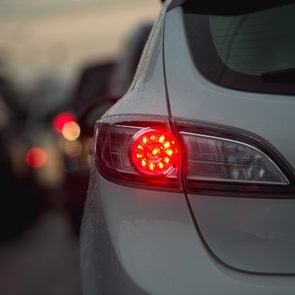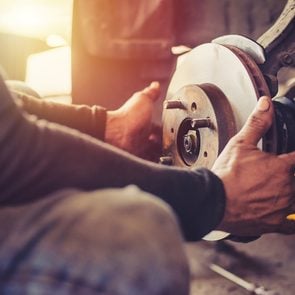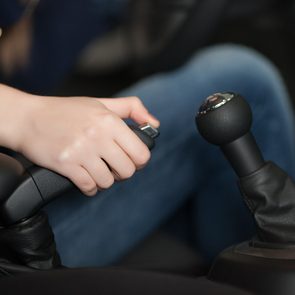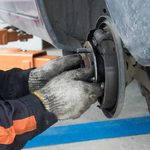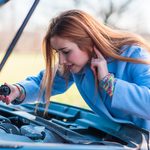Why Do My Brakes Keep Grinding?
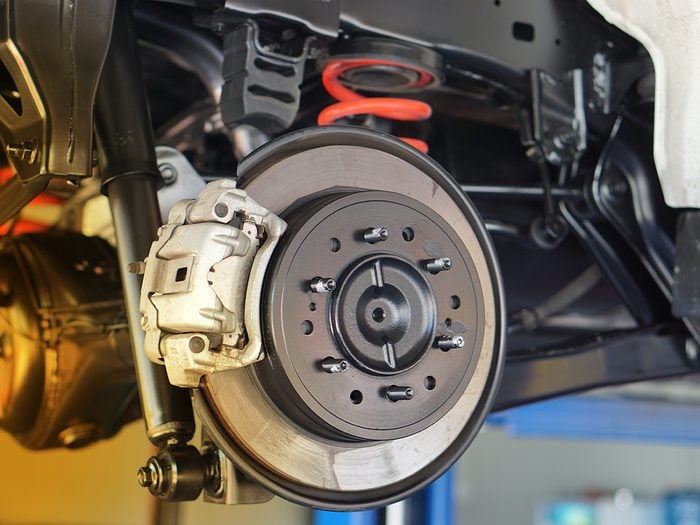
If you hear your brakes grinding, something is wrong. Here are four likely causes for the noise and what you need to do next.
Brakes are one of your car’s most essential safety systems. Never disregard grinding noises while driving or braking. When it comes to your car’s brakes, it’s always better to be safe than sorry.
Fortunately, most brake noises are considered normal and do not indicate a problem. Constant or strange grinding noises can be a sign that your brake hardware simply needs to be lubricated, or it can be a warning one or more brake system components are worn out or need servicing.
Here are four possible reasons your brakes are grinding:
Worn-Out or Poor-Quality Brake Pads
- Loud metal-to-metal grinding when stopping usually indicates the brake pad friction material is worn or has dislodged from its metal backing plate, to the point where the metal is digging into and scoring the rotor.
- Lack of proper brake caliper lube or missing shims between the brake pad’s backing plate and caliper piston will cause them to rub against one other, causing a grinding noise when stopping (as well as rattle while driving).
- Low-quality brake pads contain excess metal and fillers that scrape against and damage the surface of a rotor. They also have poor corrosion fighting properties that result in significant rust build up on the calipers and rotors, which can produce a loud grinding noise when slowing.
Replacing brake pads and rotors can be a DIY project. Do a little research to find highly-rated pads and rotors for your car and the type of driving you do.
Caliper Hardware
Worn, missing or broken brake caliper hardware, especially mounting bolts and shims, can cause grinding two ways:
- A brake caliper not fully secured to its support bracket because of loose or damaged hardware can drag and rub on the rotor, producing a grinding noise while driving and stopping.
- Dry, corroded caliper mounting slide bolts can bind and grind when applying the brakes. Binding slide bolts also cause the pads to drag on the rotors, causing them to overheat, grind and wear unevenly and more quickly.
Servicing caliber hardware when installing new brakes can be a DIY fix. Carefully remove rust, dirt and debris from the caliper. Remove and clean all hardened steel parts (caliber slide pins) by soaking them in non-chlorinated brake cleaner (not degreaser) and use a plastic brush. Do not “break” the hardened finish by cleaning with a file or wire brush.
Replace all brake mounting hardware (anti-rattle, spring clips and shims) when installing new pads. Lubricant the slide pins and caliper contact points with the appropriate high-temperature brake grease.
Brake Rotors
- Overnight, a thin layer of rust can form on a rotor and cause a grinding noise. Also, a change in temperature can make brakes grind. Once brake pads and rotors heat up, this noise stops. However, rotor surfaces heavily corroded and pitted from sitting for weeks without being driven (especially in areas of high humidity), poor quality brake pads or accumulated mud and road salts can cause grinding while stopping.
- Rotors that are glazed (smooth and shiny) due to cheap brake pads or scored from excessive wear and tear can also produce a grinding or scraping noise.
- A stone, rust flaking from a rotor or some other foreign object jammed between the rotor and pad or rotor and brake backing plate/dust shield will also make a loud grinding sound while driving or stopping.
Removing minor surface rust is a DIY task. However, even if a rotor is within manufacturer’s minimum thickness refinish specifications, it’s always better to replace rotors if they show any major pitting or wear.
Wheel Bearings
A faulty hub bearing may wobble, causing excessive rotor runout that results in uneven brake pad wear. Consequently, the brakes grind or squeal, or pull to one side when stopping. Wheel bearing replacement is best left to a professional.
Next, check out nine more strange car noises—and what they could mean.
